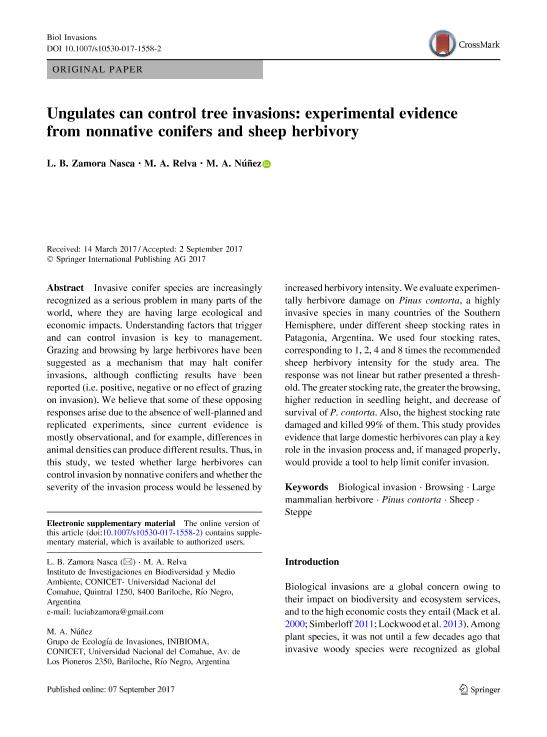Artículo
Ungulates can control tree invasions: experimental evidence from nonnative conifers and sheep herbivory
Fecha de publicación:
09/2017
Editorial:
Springer
Revista:
Biological Invasions
ISSN:
1387-3547
e-ISSN:
1573-1464
Idioma:
Inglés
Tipo de recurso:
Artículo publicado
Clasificación temática:
Resumen
Invasive conifer species are increasingly recognized as a serious problem in many parts of the world, where they are having large ecological and economic impacts. Understanding factors that trigger and can control invasion is key to management. Grazing and browsing by large herbivores have been suggested as a mechanism that may halt conifer invasions, although conflicting results have been reported (i.e. positive, negative or no effect of grazing on invasion). We believe that some of these opposing responses arise due to the absence of well-planned and replicated experiments, since current evidence is mostly observational, and for example, differences in animal densities can produce different results. Thus, in this study, we tested whether large herbivores can control invasion by nonnative conifers and whether the severity of the invasion process would be lessened by increased herbivory intensity. We evaluate experimentally herbivore damage on Pinus contorta, a highly invasive species in many countries of the Southern Hemisphere, under different sheep stocking rates in Patagonia, Argentina. We used four stocking rates, corresponding to 1, 2, 4 and 8 times the recommended sheep herbivory intensity for the study area. The response was not linear but rather presented a threshold. The greater stocking rate, the greater the browsing, higher reduction in seedling height, and decrease of survival of P. contorta. Also, the highest stocking rate damaged and killed 99% of them. This study provides evidence that large domestic herbivores can play a key role in the invasion process and, if managed properly, would provide a tool to help limit conifer invasion.
Archivos asociados
Licencia
Identificadores
Colecciones
Articulos(INIBIOMA)
Articulos de INST. DE INVEST.EN BIODIVERSIDAD Y MEDIOAMBIENTE
Articulos de INST. DE INVEST.EN BIODIVERSIDAD Y MEDIOAMBIENTE
Citación
Zamora Nasca, Lucía Belén; Relva, Maria Andrea; Nuñez, Martin Andres; Ungulates can control tree invasions: experimental evidence from nonnative conifers and sheep herbivory; Springer; Biological Invasions; 20; 3; 9-2017; 583-591
Compartir
Altmétricas




